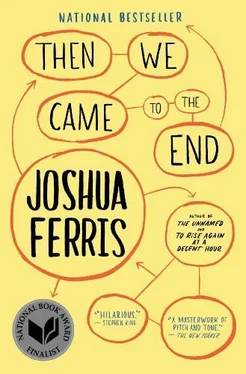“What was Brizz doing with a totem pole?” asked Marcia.
“This is nothing like my screenplay, by the way,” Don Blattner announced to the room.
“Come on, Benny,” said Jim. He had his geisha-sized feet up on Benny’s desk in a shiny new pair of Nikes. “A totem pole?”
“There it was before me,” said Benny, standing suddenly and gesturing as if before some wild spectacle, a full moon or an alien. “And there was no denying it. So I asked Phil, I said, ‘Do you know, was your brother an Indian enthusiast?’ ‘Not that I ever knew of,’ Phil said. ‘Then did your family maybe have some Indian blood in it?’ I asked him. He had his arms akimbo, like this,” said Benny, demonstrating, “and he was staring up at the totem pole like this, just staring up at it, and without turning to me he just shook his head slowly, like this, and said, ‘Brizzolera. We’re one hundred percent Italian.’”
Benny followed Bizarro Brizz inside. The kitchen counters were cluttered with various plates and bowls and serving containers, as if on display at a secondhand shop. More cutlery than a single man could use in six months sat in a clean pile on top of a dish towel. Brizz had two toasters lined up back to back, next to a toaster oven. The kitchen walls had been yellowed by cigarette smoke and the linoleum curled up at the edges of the floor. Curiously, in the surfeit of garage-sale-like clutter that defined not just the room they were in but all the rooms, Brizz had only one chair at the kitchen table.
Benny watched Phil open drawers full of utensils, hot mitts, pan lids. “We did more than just drift apart a little,” explained Phil, “or however it was he phrased it. I’d call him every couple of months, you know, but if not for that, I’m pretty sure we wouldn’t have spoken at all. Not out of malice, just. . him. Who he was.”
“That’s so strange,” said Benny, “because he was really one of the most pleasant guys to work with.”
“Oh, he was a sweet guy, my brother, you get no argument from me. But he sure was aloof. Hey, tell me about that,” said Phil. “What was it like working with Frank?”
Benny gave the question some thought: what was it like to work with Brizz? “Like I said, he was always just really pleasant,” said Benny. “He wasn’t one of those people you work with and they’re always creating friction, you know?”
That, he thought, was one lame answer to Phil’s question. He wanted to come up with a good story about Brizz that would give him a real sense of his departed brother at work, something he’d done that made us say, That’s good old Brizz for you, which would sink in and become part of Phil’s memory. But Benny couldn’t think of anything.
“What should I have told the man?” Benny asked us, long after his uploading was complete, and all we could agree on was the sight of Brizz smoking outside the building in winter in nothing to keep him warm but his sweater vest. That was a story Brizz owned, but was it a story? Or we might have told him about the talk with the building guy, but that wasn’t much of a story either. To be honest, what we remembered most about Brizz was his participation, along with the rest of us, in the mundane protocols of making a deadline — Brizz’s nicotine stink in a conference call listening to a client’s change in directions, Brizz sitting behind his desk with his reading glasses, carefully and methodically proofreading copy before an ad went to print. Hard to build an anecdote out of that. Good god, why had nobody stopped him? Why had we never, not one of us, stopped, turned around, and said, Knock knock. Sorry to interrupt you when you’re proofreading, Brizz. Why had we not gone in, sat down? Yeah, you smoke Old Golds, you keep a messy car — but what else, Brizz, what else? Would closing the door help? What fucked you up as a kid and what woman changed your life and what is the thing you will never forgive yourself for? What, man, what? Please! We walked past. Brizz never looked up. How many times did we end up down at our own offices, doing pretty much the same thing, preparing for some deadline now come and gone, while Brizz lived and breathed with all the answers a hundred feet down the hall?
“He ate two baloney sandwiches for lunch almost every day,” Benny said to Phil. “That’s what I remember about your brother the most.”
Genevieve reappeared in the doorway after having handed off her revisions to Joe.
“What’d I miss?” she asked.
SOME OF US WENT out for lunch to a new place every day and made lunch an event. Others, like Old Brizz, stayed in and had the same thing, day after day. Sometimes it was to save money. Other times it was to avoid the company of people who, from nine to noon and from one to six, we had to give ourselves over to unconditionally. For an hour in between, time reverted back to us, and sometimes we took advantage of that hour by closing our doors and eating alone.
Carl Garbedian shut his door every day and ate a Styrofoam clamshell of penne alla vodka from the Italian joint a block away and never went out to lunch with us unless it was a free team event. The free team event was a thing of the past, and so it had been months since we’d last seen Carl sliding into a booth, opening a menu, and considering his options.
Six months before being sacked, Tom Mota knocked on Carl’s door. This was only a few days or so after Benny told us the story of Carl undressing in his car. Tom apologized to Carl for interrupting his lunch and asked if he had a minute. Carl invited him in and Tom took a seat. “So I heard from Benny some things about how you were feeling lately,” Tom began, “that when I heard them, I found I could relate, so I bought you something.” Tom handed Carl a book across the desk. “Don’t be mad at Benny, you know how he likes to talk. And that,” he added, indicating the book, “that’s nothing. That’s just something everybody should have on their shelves. Do you know this guy at all?” he asked.
Gazing down upon the book — the complete essays and poems of Ralph Waldo Emerson — Carl shook his head.
“Nobody does anymore,” said Tom. “But everybody should. And I know that sounds like a bunch of pretentious bullshit, but it’s bullshit I believe in.”
Carl inspected the book and then looked up at Tom as if he needed an explanation of how to use the thing.
“And I know it’s maybe a little funny, me buying you a book,” Tom continued. “We don’t buy each other books around here. But I was listening to Benny and he said you weren’t feeling yourself lately, and when I asked him why and he tried to explain, I thought that what might help you was a little guidance from this guy here.”
“Thanks, Tom,” said Carl.
Tom shook his head dismissively. “Please don’t thank me, it’s a six-dollar book. Odds are you won’t even read it. It’ll sit on your bookshelf and every once in a while you’ll come across it and think, now why’d that fuck ever buy me this book for? I know what it’s like to get a random book,” he said, “trust me, but listen — let me read you a few things so you see better where I’m coming from maybe. Can I do that?”
“If you’d like,” said Carl. He handed the book back to him.
Tom paused. “Unless maybe you’d rather me just leave you to your lunch,” he said.
Carl removed the napkin from his lap and wiped his hands. “It’s fine if you want to read some of it, Tom,” he said.
So Tom opened the book. “It might help, I don’t know,” he said. He thumbed nervously through the pages for the passage he wanted. It was probably a fraught moment for both men, a self-conscious and brittle silence as Tom prepared to read. When he finally located the passage he wanted, he began quoting but immediately cut himself off again. “And listen,” he qualified himself, thrusting forward in his chair with abrupt eagerness, “I know it’s maybe a little funny, here’s me talking to you about how you can improve your life with this book and look at me, I’m a total fuckup. This last year has been. . let’s just say I see the error of my ways. But what it is with me, it’s funny. I see the error of my ways, but I can’t seem to get my head out of my ass, basically, is the basic fact of my life since my wife left me. So, please, forgive the hypocrisy of the unconverted sitting here preaching to you, but I do find that when I read Emerson, at the very least it calms me down.”
Читать дальше












